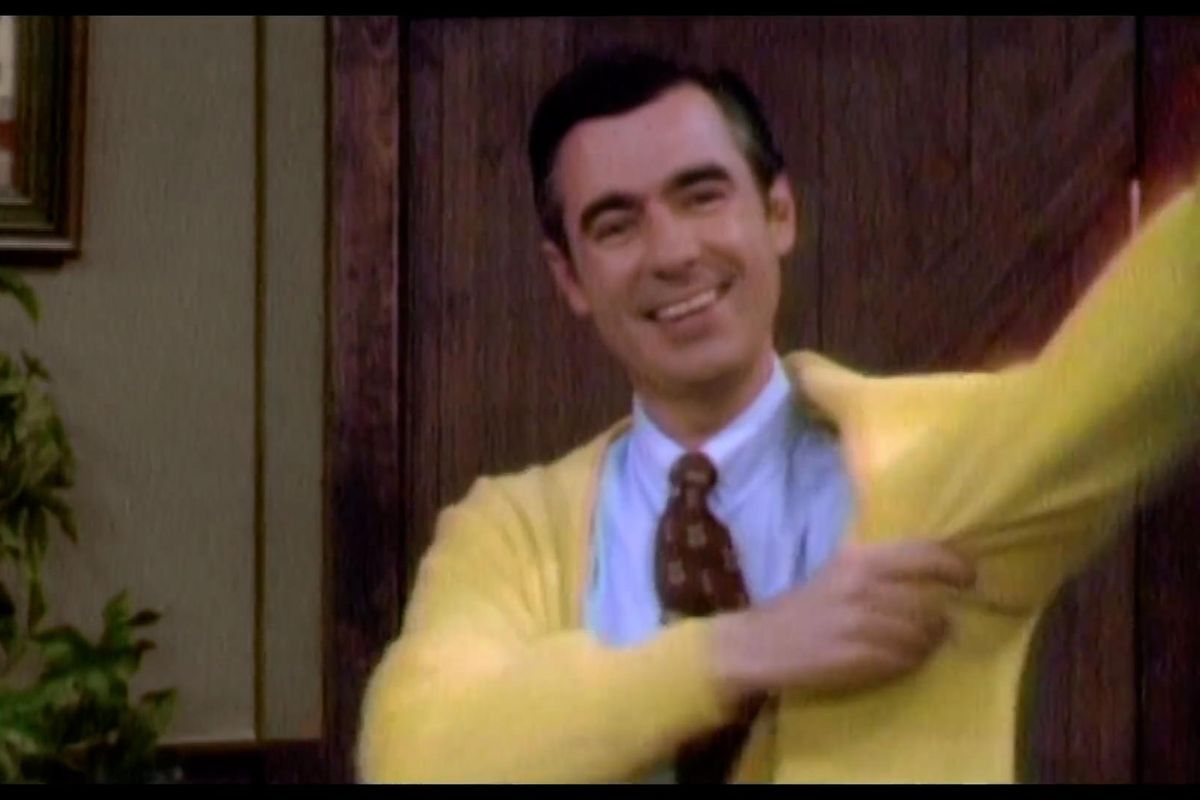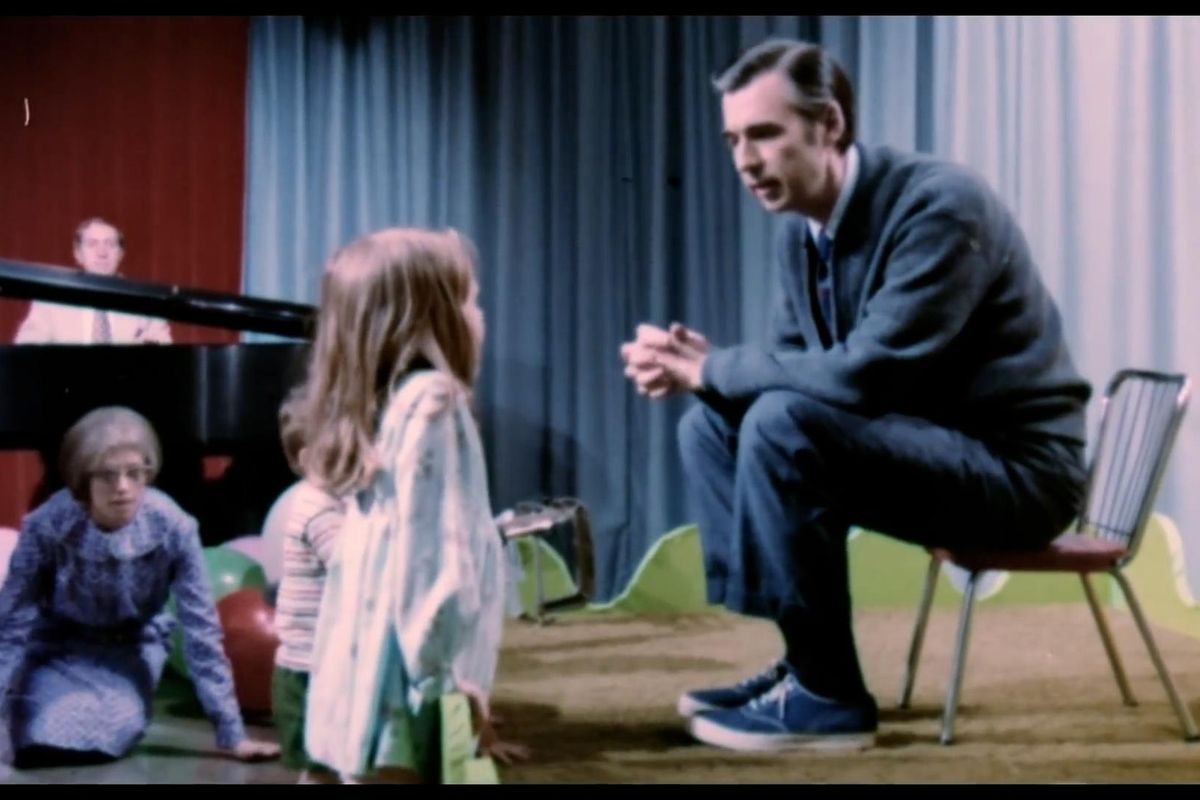What exactly were Mister Rogers' views towards the LGBTQ community?
In many ways, Rogers was well ahead of his time, boldly pushing boundaries in the right directions.

Mister Rogers consistently shared love and kindness.
A few nights ago, I was sitting in a dark theater — popcorn in hand and tears leaking down my face — embarrassingly bent out of a shape from a movie trailer. Fred Rogers was to blame.
The whimsical theme song to "Mister Rogers' Neighborhood" concluded a short but powerfully nostalgic preview for the new documentary about the soft-spoken star, "Won't You Be My Neighbor?" And yeah, I'd morphed into a teary-eyed hot mess in a matter of seconds.
A question popped into my queer little brain right then, though, and I'm not entirely sure why:
Could Rogers have quietly been a homophobe?
He was a religious dude who grew up in a wildly different era than today. It's a toxic combination that, if we're overgeneralizing and I reflect on my personal experience, tends to produce the worst kinds of homophobes. Had the former Presbyterian minister been as saintly to queers like me as he'd been to seemingly everyone else?
I needed answers! So I went searching.

History suggests Rogers saw humanity in LGBTQ community.
Photo pulled from YouTube official trailer, "Won't You Be My Neighbor?"
But first, let it be known that I respect Rogers and cherish the mark his big-hearted series left on me and generations past; I certainly wasn't looking for justifications to write a "Mister Rogers" hit piece. In a dark and dreary world, Rogers was a reliably bright light, and I wanted whatever I discovered to confirm my suspicions that the beloved children's advocate was a benevolent force for good — and nothing else.
But one thing I've come to learn as a jaded gay man is that the more flawless a fave of mine seems to be, the harder they fall from the high pedestal I've placed them on once their shortcomings inevitably air. Rogers could very well be the latest victim of my hero-worshipping, I warned myself, opening a Google tab with a preemptive cringe.
Here are the two big things I discovered:
1. Rogers' unfaltering kindness and compassion certainly extended to the LGBTQ community.
Rogers didn't go on the record with specific opinions about LGBTQ people or the matters that affect them (at least from what I could find). But others have reported their experiences with him on the topic. By putting those puzzle pieces together, I would confidently argue that Rogers saw the humanity in LGBTQ people.
He didn't let his faith box him into any certain ideology regarding gay people or their rights. Michael G. Long, who authored the biographical "Peaceful Neighbor: Discovering the Countercultural Mister Rogers," noted Rogers' church in Pittsburgh was and continues to be inclusive to the LGBTQ community. Rogers' widow, Joanne, has said her husband had close friends who were gay, according to Slate.
He also stood strong against outside pressures to use his platform to condemn same-gender relationships, according to Vox's Todd VanDerWerff. Panning homosexuality likely would have been applauded by many parents tuning in, as mainstream America widely embraced homophobic attitudes throughout much of Rogers' reign.
But doing such a thing on-air never felt right to the sweater-loving saint. "He felt everybody was, in some way, a reflection of God," VanDerWerff wrote.
2. But Rogers wasn't immune to the backward views society has held of queer people.
While Rogers hired and befriended Francois Clemmons — a gay man who played Officer Clemmons in the series for 25 years — he didn't necessarily want the show associated with Clemmons' sexual orientation, either.
After word got back to Rogers that Clemmons had been spotted in a gay bar, Rogers asked the actor to avoid such venues, fearful Clemmons' sexuality would bring negative attention to the show.
"It was not a personal statement of how he felt about me," Clemmons assured UU World in 2016, noting the two remained close friends. "It had to do with the economics of the show."
Rogers urged him to stay in the closet, believing Clemmons' sexuality may alienate viewers. He encouraged him to marry a woman, too. Clemmons did — and the relationship ended in divorce a few years later.
It's difficult to reconcile the harmful actions of an icon who lived in a different time.
I wish Rogers had addressed Clemmons' predicament differently, of course. I wish he'd celebrated Clemmons' queerness on screen and off and allowed the actor to sashay his way on stage one trailblazing episode, rainbow flag held high.
But that's the thing: The rainbow flag wasn't associated with LGBTQ pride when Clemmons considered leaving the closet, because LGBTQ pride wasn't even a thing in those pre-Stonewall days (at least in the mainstream). It's not reasonable for me to expect a straight, cisgender man — even a superhero like Rogers — to possess a visionary moral compass and will to champion queer rights half a century before same-gender marriage even became normalized.
Rogers was extraordinary — but he wasn't a social justice clairvoyant.
Mister Rogers' empathetic nature pushed him, and his viewers, to be bold and continually grow in wonderful ways.
It's what has helped enshrine my appreciation for him and his show.
He adored kids and relentlessly fought for their wellbeing. His show regularly took on important and tough topics, like racism, the messiness of divorce, and the importance of inclusion. In many ways, Rogers was well ahead of his time, boldly pushing boundaries in the right directions.
Even on queer issues, Rogers evolved as time went on.
As Long wrote for HuffPost in 2014, Rogers' perspective on Clemmons' sexuality shifted throughout the years:
"Rogers evidently believed Clemmons would tank his career had he come out as a gay man in the late 1960s. But — and this is a crucial point — Rogers later revised his counsel to his younger friend. As countless gays came out more publicly following the Stonewall uprising, Rogers even urged Clemmons to enter into a longterm and stable gay relationship. And he always warmly welcomed Clemmons’ gay friends whenever they visited the television set in Pittsburgh."
I can't speak for Mister Rogers, of course. But he was the one who always told me, "I like you just the way you are."
If he were around today, I'd like to think queer kids would feel right at home in his neighborhood, too.
Watch the trailer (that made me cry) for "Won't You Be My Neightbor?" below:
This article was written by Robbie Couch and originally appeared on 06.07.18
- Dan Levy’s mom regrets worrying about her 'little boy who loved to twirl' and cue all the tears - Upworthy ›
- The group turning religious leaders into LGBTQ rights crusaders - Upworthy ›
- George Montague, 'the oldest gay in the village' has passed away. - Upworthy ›
- David Pinsof's theory on onions - Upworthy ›
- Viral "agenda" for dad's night out holds important lesson - Upworthy ›
- Antigay theologian shares 3 reasons why he changed his mind and learned to love LGBTQ people - Upworthy ›
- Trans rights advocate skewers Texas Lt. Governor with bathroom prank - Upworthy ›
- Epic video of Mister Rogers addressing congress resurfaces - Upworthy ›
- The beautiful family legacy born from a lavender marriage - Upworthy ›





 Pitch moves so slowly it can't be seen to be moving with the naked eye until it prepares to drop. Battery for size reference.
Pitch moves so slowly it can't be seen to be moving with the naked eye until it prepares to drop. Battery for size reference. The first seven drops fell around 8 years apart. Then the building got air conditioning and the intervals changed to around 13 years.
The first seven drops fell around 8 years apart. Then the building got air conditioning and the intervals changed to around 13 years. John Mainstone, the second custodian of the Pitch Drop Experiment, with the funnel in 1990.
John Mainstone, the second custodian of the Pitch Drop Experiment, with the funnel in 1990. Yorkie GIF
Yorkie GIF A father does his daughter's hair
A father does his daughter's hair A father plays chess with his daughter
A father plays chess with his daughter A dad hula hoops with his daughterAll illustrations are provided by Soosh and used with permission.
A dad hula hoops with his daughterAll illustrations are provided by Soosh and used with permission. A dad talks to his daughter while working at his deskAll illustrations are provided by Soosh and used with permission.
A dad talks to his daughter while working at his deskAll illustrations are provided by Soosh and used with permission. A dad performs a puppet show for his daughterAll illustrations are provided by Soosh and used with permission.
A dad performs a puppet show for his daughterAll illustrations are provided by Soosh and used with permission. A dad walks with his daughter on his backAll illustrations are provided by Soosh and used with permission.
A dad walks with his daughter on his backAll illustrations are provided by Soosh and used with permission. a dad carries a suitcase that his daughter holds onto
a dad carries a suitcase that his daughter holds onto A dad holds his sleeping daughterAll illustrations are provided by Soosh and used with permission.
A dad holds his sleeping daughterAll illustrations are provided by Soosh and used with permission. A superhero dad looks over his daughterAll illustrations are provided by Soosh and used with permission.
A superhero dad looks over his daughterAll illustrations are provided by Soosh and used with permission. A dad takes the small corner of the bed with his dauthterAll illustrations are provided by Soosh and used with permission.
A dad takes the small corner of the bed with his dauthterAll illustrations are provided by Soosh and used with permission. shocked cat GIF
shocked cat GIF Bored Cat GIF
Bored Cat GIF